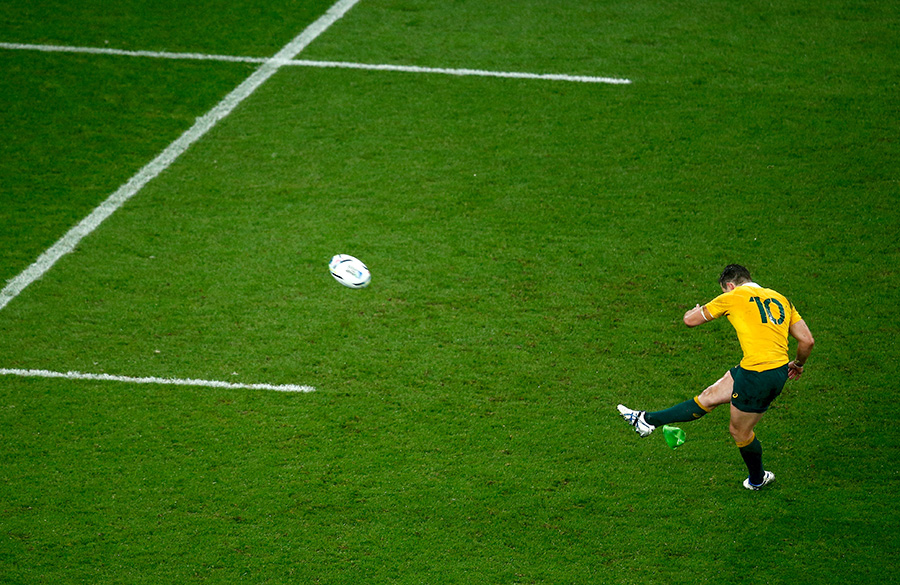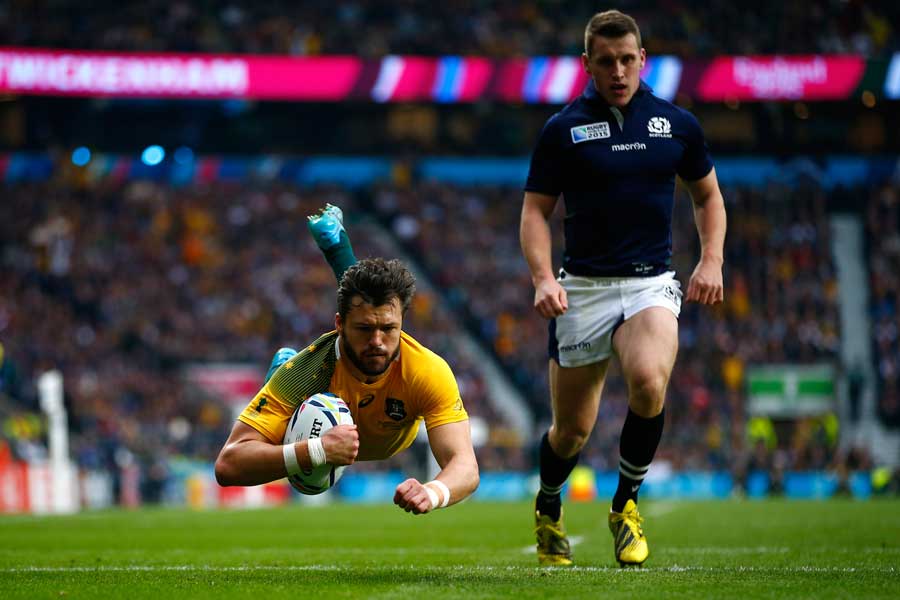|
Rugby World Cup
Wallabies purred and spluttered in equal measure against Scotland
Greg Growden
October 18, 2015
Australia did everything they could to lose
TWICKENHAM, London -- Winning the tight encounters is the hallmark of a great team, but Australia should not be beating their chests after defeating Scotland as they are very lucky to still be part of the Rugby World Cup. The Wallabies, for so long the tournament "golden boys", would have been on their way home on Monday but for a debatable final-minute offside penalty that Bernard Foley succeeded to kick for the most contentious of one-point victories. Scotland were understandably gutted, as like Wales the previous day against South Africa on the same pitch, they had shown enormous resolve and appeared to have succeeded in forcing Australia into making enough dumb mistakes to bring about the biggest upset of the quarterfinal stage. They constantly put key Australian players under enormous pressure in their own half, prompting brain explosions that led to charge-downs and intercept tries that enabled Scotland to lead for lengthy periods of the game - including from the 74th minute until the 79th minute, when South African referee Craig Joubert made the defining call.

Bernard Foley of Australia kicks the match-winning penalty © Getty Images
Enlarge
There were many frenetic moments in this dramatic game, but none more than when Joubert, clearly realising his final decision would have antagonised so many, did the ultimate disappearing act in frantically sprinting from the field as soon as he whistled full-time. It was a sour moment, as was the way the Australian team, through no fault of theirs, was then subjected to endless jeering. That's why comparisons with Australia's similarly dramatic 1991 quarterfinal victory, when they defeated Ireland in the final minutes, should not be made.
Australia 35-34 Scotland (Australia only)
%]Australia got out of that mess at Lansdowne Road, after Ireland had taken the lead through Gordon Hamilton, with exceptional leadership from Michael Lynagh, who provided the right game plan that led to the match-winning try. It was inspirational, and a joyous moment, especially as the thousands of Irish fans in the ground, who could have reacted so aggressively, instead immediately embraced their Australian cousins. I was at Lansdowne Road that night, and will never forget it. Of the countless Wallabies Tests I have covered, that remains my favourite match. There was an overwhelming sense of goodwill, and that was entirely due to the Irish. There was none of that feeling of euphoria at Twickenham. Instead you left the arena with a sense of unease. Ill-feeling over that contentious last penalty led to the most unsavoury of scenes at the end of the game, with the Wallabies roundly booed during the after-match ceremonies. A small core of Australian supporters attempted to give the Wallabies the cheers they deserved for refusing to give in, but their support was drowned out by the thousands who thought Scotland had been robbed. Not surprisingly the media conferences revolved around whether the Wallabies had just been involved in the ultimate 'great escape', as several other big refereeing decisions went their way - including Joubert's harsh step of sending Scotland winger Sean Maitland to the sin bin for a deliberate knock-on. As soon as Maitland had left the field, his opposite Drew Mitchell scored on that side of the field.

Drew Mitchell of Australia scores his team's fourth try © Getty Images
Enlarge
Wallabies coach Michael Cheika handled the 'great escape' suggestion well, explaining that his team did score five tries- a fair feat in a World Cup quarterfinal.
How can northern hemisphere teams compete?
%]"If that's an escape, then I'll take that escape," Cheika said. He was right. There were good aspects to the Wallabies win. Their persistence in wanting to play in an adventurous vein was admirable, producing several excellent stanzas of play in which quick hands forced overlaps and three tries out wide. At times, the Wallabies were purring; but most of the time they were spluttering, struggling in particular at the scrum, and that had a lot to do with Scotland's relentless in-your-face attitude that came so close to seeing several Australian players suffering the worst of World Cup nightmares.

Australia's Adam Ashley-Cooper flies for a try © Getty Images
Enlarge
Foley, while relieved to kick the final definitive goal, is bound to wake up in the middle of the night to mull over his chip-kicking blunder in the 59th minute, which led to a charge down and a try by Tommy Seymour that brought Scotland right back into the game. James Slipper was then saved from the humiliation of seeing a World Cup campaign collapse all around him when the silliest of floating passes aimed somewhere in the direction of Mitchell was instead grabbed by Scotland centre Mark Bennett for a try that appeared to be the match winner for the underdogs. Then the referee reappeared to cut Scotland right off at the pass. The Wallabies got away with it, but they won't next weekend against Argentina if they play so erratically. Priority No.1 is getting David Pocock back to full fitness and into the team, as his poise and power at the breakdown was immediately missed. With Pocock on the sidelines, Scotland enjoyed numerous flourishing breakdown moments; without Pocock, Australia are not the real deal- as Scotland came so close to proving. © ESPN Sports Media Ltd.
|
Live Sports
Communication error please reload the page.
-
Football
-
Cricket
-
Rugby
-
- Days
- Hrs
- Mins
- Secs
F1 - Abu Dhabi GP
Abu Dhabi Grand Prix December 11-131. Max Verstappen ()
2. Valtteri Bottas (Mercedes)
3. Lewis Hamilton (Mercedes)
4. Alexander Albon ()
5. Lando Norris ()
6. Carlos Sainz Jr ()
-
ESPNOtherLive >>
Golf - Houston Open
Snooker - China Open
Tennis - Miami Open

